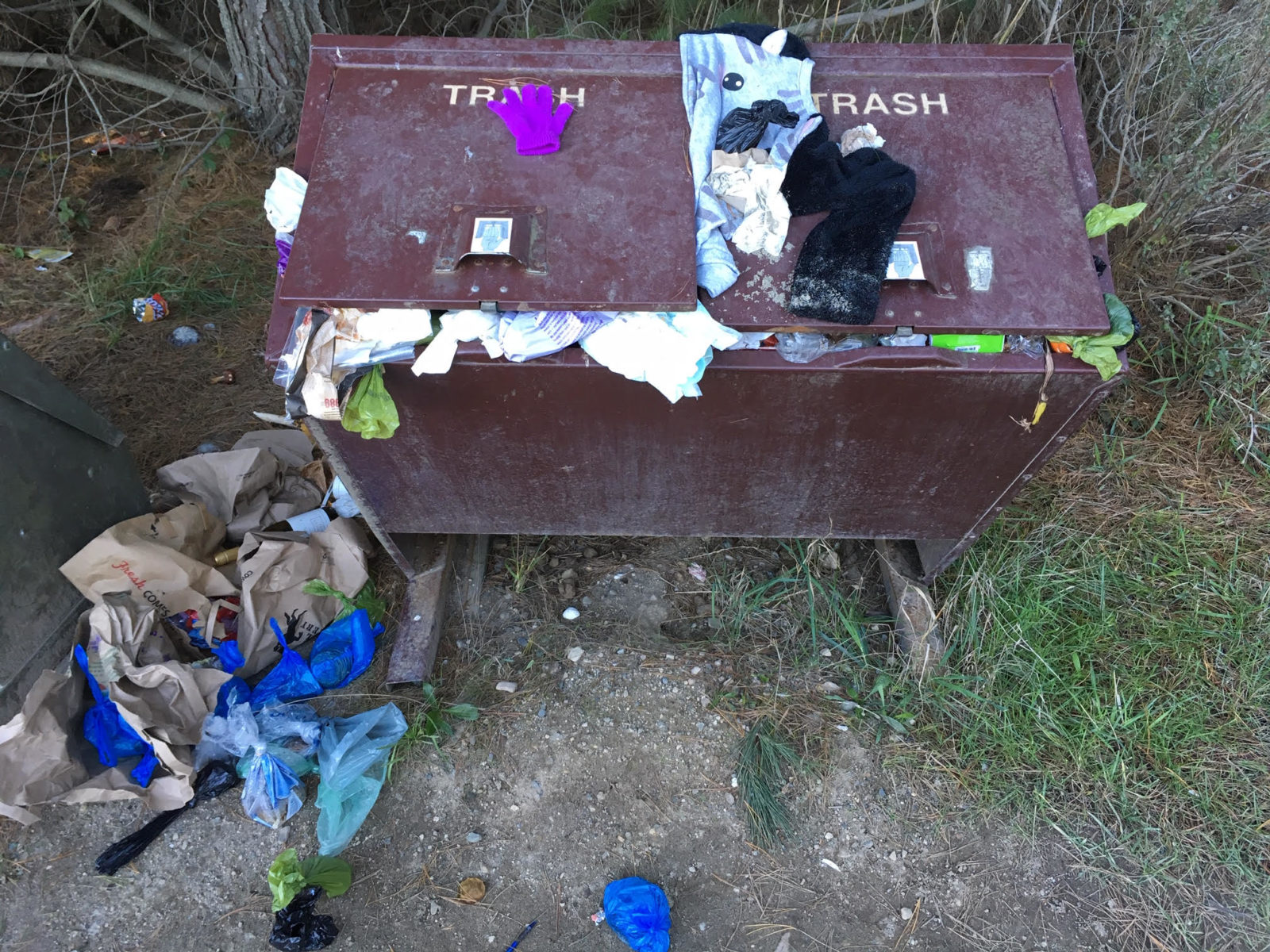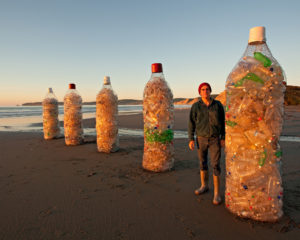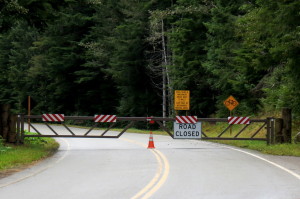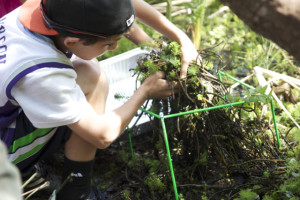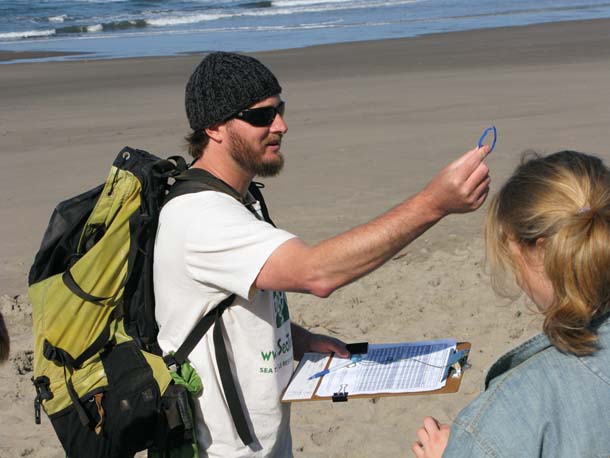The partial federal government shutdown, now the longest in U.S. history, has made life truly miserable for some people. But when it comes to parks and public lands, most of which in the Bay Area have remained open but unstaffed, the shutdown also provides a window into an eternal truth about life in the absence of authority: some people are really mindless jerks and many more people are not.
Earlier this month off-road drivers took advantage of the lack of enforcement in the Golden Gate National Parks to carve donuts in the fragile grasslands of the Marin Headlands, reports Golden Gate Raptor Observatory director Allen Fish. Visitors to Joshua Tree cut down irreplaceable trees and threatened a quadriplegic Marine Corps veteran and beloved park regular for suggesting they behave. Without park staff to empty them, trash bins overflowed at Limantour Beach, and instead of hauling it out themselves people just kept stuffing their plastic bags full of dog poop on top of the pile. Visitors unable to use the overflowing toilets of Point Reyes simply used the side of the bathrooms instead.
Yet, as essayist Rebecca Solnit once put it, extraordinary communities arise in times of disaster. Numerous community groups, private companies, and civic leaders have convened to haul trash away from open federal lands. San Francisco Public Works has helped with cleanup around Lands End, Aquatic Park, and Fort Funston. The owner of Marin-based Green Hauling took it upon herself to empty Point Reyes National Seashore trash cans. Small bands of private citizens organized to pick up trash in the Don Edwards National Wildlife Refuge and Marin Headlands.
And the public and private esprit de corps doesn’t stop there. At the Don Edwards headquarters in Fremont, Refuge Manager Anne Moorekill says, hikers have been lovingly wiping down the trail signs to keep them clean. A retired couple from Indiana visiting the refuge as part of a federal RV voluntourism program lost their volunteer status because of the shutdown — so the San Francisco Bay Bird Observatory stepped in and gave them a different volunteer project so they wouldn’t have to cut their vacation short.
Still, the federal government is irreplaceable when it comes to science, and its shutdown has harmed or halted critical scientific work around the country. Mike Vasey, the director of the San Francisco Bay National Estuarine Research Reserve, said a new regional wetland monitoring program has stalled because participants from Fish and Wildlife, NOAA, and the U.S. Geological Survey can’t attend coordination meetings. State and university partners have tried to step in and help, but it’s hard to run a complex cooperative project without half the people in the room. “From a perspective of trying to move the ball forward in a short time frame, we’re not stymied,” he said. “But we have to try to do these things without a real key part of our community.”
Moorekill said Fish and Wildlife and USGS have skipped an annual Bay winter waterbird survey, and had to cancel meetings to start work on South Bay salt pond restoration. If the shutdown continues, they’ll likely miss Ridgway’s rail population monitoring, a crucial piece in understanding the success of Bay wetland restoration. But, she said, wildlife research that was already permitted to non-federal groups can continue on federal land so long as a federal employee doesn’t have to be there.
Moorekill has a limited exemption from federal employee furloughs to check on the refuge for a few hours a day. She said so far she’s pleasantly surprised at the physical condition of the park. “Other refuges in the state are having more issues, where it’s more of a remote refuge and certain visitors are taking advantage and damaging things,” she said. “In our urban areas, people are stewards. Fingers crossed.”
But Golden Gate Raptor Observatory Director Fish said the idea that people can take care of public resources on their own is an insult. “My [National Park Service] colleagues are the most devoted people to public and natural and cultural resource protection I have ever met,” he wrote in an email. “To keep huge areas of the GGNRA, like the Marin Headlands or Muir Woods or Ocean Beach, open to the public but without the staffing for protection, with bathrooms locked, to create a false suggestion that we are in ‘business as usual’ mode, is heinous. We are leaving tourists to poop behind coyote bushes and coastal redwoods, and those are the modest tourists. The parklands need professional caretakers, and people behave badly in national parks when they believe they are not being watched.”
Federal nonprofit partners that typically organize volunteer trips into the parks have shuttered their operations over safety and liability concerns. “Take care,” Moorekill said she’d like to tell people, “and recognize you’re on your own.” In a Friday email newsletter, Donna Faure, the executive director of the Point Reyes National Seashore Association, wrote, “The National Park Service asks that you wait until the shutdown is over to volunteer your services as conditions are hazardous and the NPS cannot provide supervision and support around safety issues.”
Extraordinary communities arise in times of disaster, though. If you’re worried about public land, go visit. Pick up trash. Document problems. Help remind other visitors to stay on the trail. Help remind other visitors that people can consider other people and cooperate even without grownups around. Help everyone stay safe.
If you can’t go on your own, there’s a Sierra Club meetup at Don Edwards on Saturday. An open-to-anyone gathering at Ocean Beach that the organizer, Annie Burke, has hashtagged the #shutdowncleanup. And there are a lot of people who just go out and pick up trash all the time, government shutdown or not.
Some scientists who study early human origins believe that the singular feature that sets humans apart from other species is our ability to cooperate. We cooperate, they also think, to make ourselves more effective as warriors. In other words, go back 150,000 years in Homo sapiens history and you’ll find some people being really mindless jerks and many more people being not.
There is, in this government shutdown and in our Bay Area national public lands, probably an opportunity to pick one behavior or the other.

